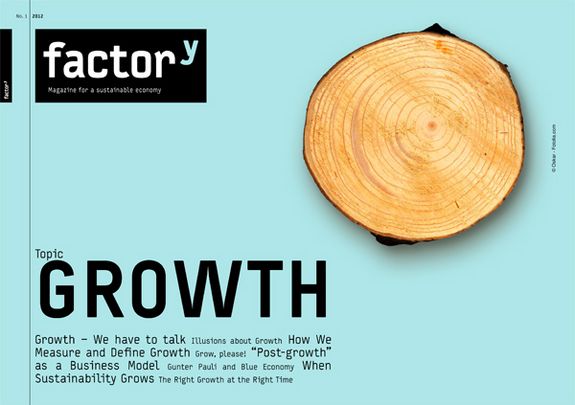Growth


Growth and a sustainable economy, how does this go together? It works particularly in small and medium-sized enterprises that are usually not associated with sustainability at first glance: craft enterprises. Examples show that this is exactly where limits to growth imply more sustainability.
By Christine Ax
Translated from the German by Christine Kuhn and Luzie Schmitt
Nearly one million craft enterprises exist in Germany. The economic sector is subject to a continual process of change. Every year, thousands of craft enterprises are created, closed down, bought up or taken over. Most of them work locally and very rarely open a branch. This is why they can copy successful concepts without competing with each other.
These enterprises rarely grow out of their status as craft enterprises to become ‘mass producers’ and ‘industrial’ enterprises. Nevertheless, small-scale enterprises have strengths and weaknesses related to their size. Growth, however, is not on the agenda for most craft enterprises. Growth is not easy, it hurts, it requires money, time and the full attention of the manager. Growth is always a critical phase and full of risks. Is investing worth it? Does the market, the environment, the customer change? But sometimes growth is necessary and makes sense. It needs to be approached carefully, since craft enterprises cannot afford errors. They do not have the required assets to take high risks. The following three enterprises demonstrate that growth is possible in a sustainable way and does not always require great size.
Growing together: cooperation that works
In 2008, the Wuppertal enterprise Raumfabrik won a prize for cooperation. Since then, a lot has happened. The Wuppertal model, meaning the cooperation of various enterprises for renovation, redevelopment and construction, has been very successful and has been adapted in other places throughout Germany. Other similar enterprises have been founded in order to offer everything concerning living/renovating/building from one supplier.
Klaus Braun, chairman of the association and one of its founders, says that the cooperation had been extremely valuable for them. Now they work with clients on projects that they would never have tackled on their own. This concept enables all of the partners to draw from each other’s competences and know-how, as well as to acquire new clients. They do not only share and exchange business prospects but also ideas and experience. Common problems, such as recruitment initiatives and marketing issues, are solved together.
More than half of the founders consider the concerted enterprise a success. They have remained part of Raumfabrik until today. Expanding Raumfabrik is not on the table for now, as the effort to integrate more partners would be too high. However, the model could of course be multiplied. Concerning his painting company, Klaus Braun has not regretted taking part in this association. With ten employees and eight apprentices, his company is neither big nor small for a paint shop.
The question whether he would like his company to grow has already been answered. Braun admits he does not want the size of his company to increase – rather to decrease. He prefers being big among smaller businesses to being small among bigger businesses.
Sustainable growth
An Austrian craft enterprise in the federal state of Vorarlberg has been developing in a very peculiar and sustainable way for the past 30 years. While still young, Arnold Feuerstein, the company founder, was very successful, but an early heart attack forced him to reconsider the growth issue thoroughly. The result was an unusual and highly successful company that is living and growing by its own rules.
The company, which goes by the name of Dorfinstallateur (village plumber), enables master craftsmen to work according to the principles of an 'independent entrepreneurship' that incorporates all of the benefits and strengths that can result from the assistance provided by 'staff units'. Each of the 15 shareholders leads a team of his own in the form of a regional 'profit centre' and is at the same time unburdened as well as supported by centralised services. Every shareholder participates in the company's success and is involved in major decisions. The 'systemic' management supports and organises internal communication as well as the company's further development including all of its 'units'.
The more than 100 employees of the company have just recently defined sustainability as the prime corporate objective; there is no clear definition of the required number of shareholders. This exceptional business model provides the ideal setting for anyone who wishes to grow into corporate responsibilities. The values the company stands for are the following: working in teams with fun and respect; turning every customer into a regular customer; being a social role model; and assuming responsibility for economic efficiency and healthy growth.
So, what is meant by the term 'healthy growth'? Johannes Ouschan, the company's CEO, explains it this way: “First of all, our understanding of growth concerns quality. Maximising profits is not our goal; it's exactly the other way round: our profit represents the result of successfully applied values. We ourselves only want to earn as much money as we really need. In addition, we want to produce and supply items that people really need and that are of sustainable use as well.”
Inter-generational contracts: family businesses
Siegfried Huhle, co-owner, and father of the current CEO of the Huhle Stahlbau GmbH, a steel construction company, explains that the entire company agreed to take a break from economic growth. The family-run enterprise has been in the market for 100 years and has accumulated a staff of 100 employees. This much growth was not planned. Siegfried Huhle is convinced that the company's growth has to do with their dedication to junior staff training; his strong commitment to future generations goes so far as to buying his employees' children's diapers for the first year of their lives.
When Siegfried Huhle talks about his apprentices, he praises them highly: “All of them are so good that you want to keep them – and when you have good employees, you do a good job, which then leads to increasing numbers of orders.” Since he also serves actively as the guild chairman and has a thorough knowledge of the steel construction industry, he knows from his own experience that the leadership succession is a particularly critical point in terms of growth for the entire company. To him, growth is only practical when it is fun and when the company's future is secure. Siegfried Huhle believes that it is unnecessary for the economy as a whole to grow any further. In his opinion, it is important to concentrate on securing the social achievements for the employees and to work on the protection of the environment. He and his partners have been actively involved in a circle of eco-profit businessmen for a long time; there, talk accompanies action. Due to the new building that has recently been constructed, the company's office building is capable of generating more electricity than it consumes. No reports on sustainability are drafted, but the company lives according to principles of environmental protection and social commitment. Since 2010, when his son became a part of the company's leadership, Siegfried Huhle has been responsible for another important task: Friday has recently become 'Emil's day'. This is the time when he takes his grandson for a walk through town in the buggy, proudly showing Emil the bridges and buildings in the city of Wiesbaden that granddad and his team once built.
News zum Thema
- 10/2016 | European Resources Forum (ERF) on 9 – 10 November 2016
- 10/2016 | Environmental tax reform for climate protection and social justice
- 07/2016 | Planetary Urbanism – The Transformative Power of Cities in 50 Selected Works
- 11/2015 | The Hope for COP
- 10/2015 | If a major economy takes the lead, warming could be limited to 2°C
- 06/2014 | 2013 is another Record Year for Renewables
- 05/2014 | "Growth" issue now available
- 10/2013 | Germany could be greenhouse-gas-neutral by 2050
- 01/2013 | For a Better Energy Efficiency Policy
- 01/2013 | A New Way of Assessing our Economies: The Prosperity Quintet
Themen
- The Domino Effect: the Mobility Transition as an Engine for the ‘Great Transformation’
- Cities Use the Space
- Decarbonization by 2030
- The fear of biting the hand that feeds you
- Where investing is a pleasure
- Why divestment is going to change the world
- A Robin Hood tax for climate protection
- May the Force Be with Us
- Modern Strategies
- The prerogative of interpreting the future now lies with the companies involved in climate protection”
- From Negotiating to Trading Equitably
- Can a donkey be tragic?
- Rethink rather than rebound: a sufficiency revolution must precede the efficiency revolution
- On Rebound, Prebound and Performance Gaps
- So Let Us Seize Power Then!
- With Common Property Against Political Failure
- So Let Us Seize Power Then!
- The Comforting Beauty of Failure
- “It Is Not Impossible at All.“
- Resource-light shopping
- Men Have Not Stopped Giving the Advantage to Women – So Far
- Toothpaste for Princesses and Soup for Pirates
- It is about equality
- A nice day
- Initiative instead of frustration
- The right ingredients
- Resilient for Life
- Not only, but also
- Appreciation – more please!
- Worth more than money
- Learning to value the value of goods
- Worth and Values
- The Transformative Power of Science
- Historically effective: How innovation and technology transform
- The Disappearance of Products
- Growing Older 101
- Columbus’ Egg
- It Works! In Theory at Least ...
- What If...?
- Analysing Separately – Thinking and Acting Together!
- Let’s Break Away from Determined Breaking Points
- More Gold in Waste than in Mines
- The art of separation
- Should you really DIY?
- The Aesthetics of Do-It-Yourself
- Standing on One’s Own Feet
- From the handaxe to desktop fabrication
- Using Shares to Survive the Crisis
- When Citizens participate
- Possess to Participate
- The Right Growth at the Right Time
- Gunter Pauli and Blue Economy
- When Sustainability Grows
- How we treat Growth
- Illusions about Growth


